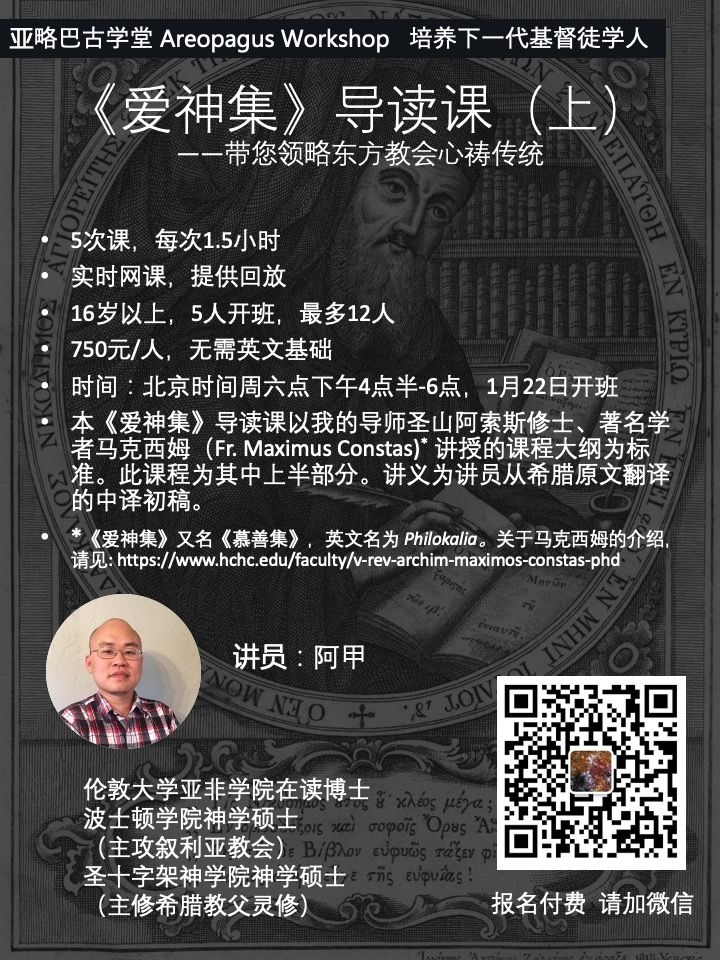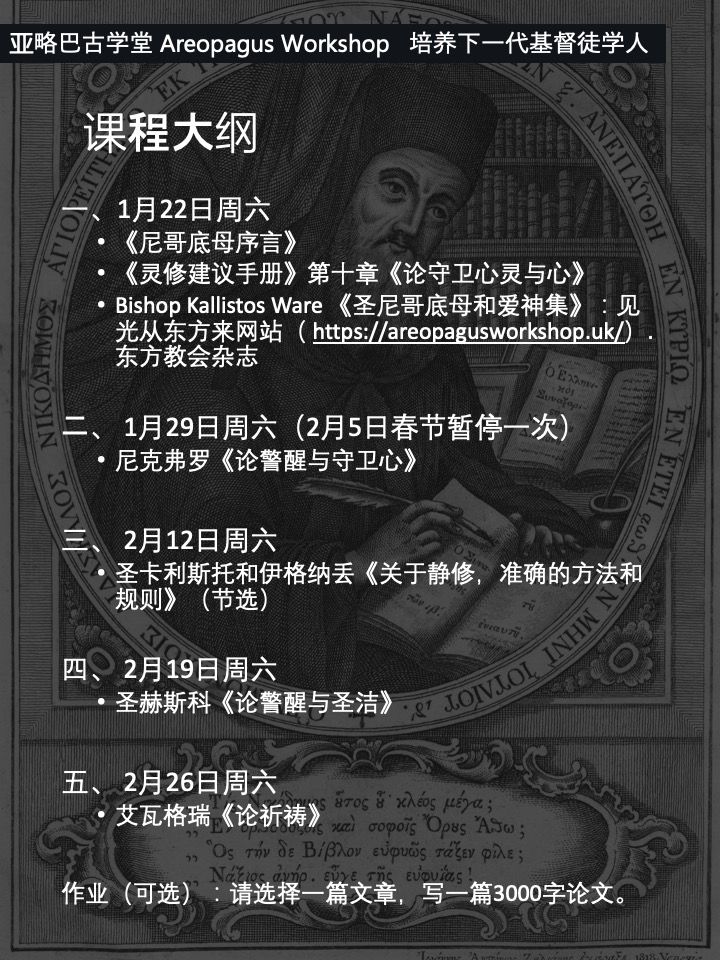
2021至今,伦敦大学亚非学院(SOAS)在读博士 2019-2020,波士顿学院,神学硕士,主修叙利亚传统 2015-2018,波士顿圣十字架希腊正教神学院,主修希腊教父灵修。
The introductory class of "Love God Collection" is here, and the class will start on January 22
All who will do the first commandment of our Lord Jesus Christ!
All who will live a life of watchfulness and prayer!
All who are eager to pray!
bring it on! This course will introduce you to the tradition of prayer in the Eastern Church
In this era of rampant secularism and no bottom line of moral depravity
Let's fight them with inner prayer, because inner prayer is our spiritual fortress


I introduce this course in the words of Friar Nick Furrow. He says,
All who long to be illuminated by the magnificent light of our Savior Jesus Christ; all who desire to feel in their hearts the flame of the heavens; all who are eager to reconcile with God in experience and feeling; Those who have received the treasure hidden in our hearts (cf. Matthew 13:44); those who have given up all worldly things, grasping the present moment, and who will light the torch of their souls with joy; those who will know from experience and knowledge that the kingdom of heaven is within you people (see Luke 17:21), come! I will impart to you the knowledge of eternal life, the life in heaven, or rather, the practice of these [i.e. inner prayer].
St. Nicodemos of The Holy Mountain and St. Makarios of Corinth eds., Φιλοκαλία τῶν ἱερῶν νηπτικῶν: ἐνερανισθεῖσα παρὰ τῶν ἁγίων καὶ θεοφόρων πατέρων, 3rd ed., vols.1 (Athens: Aster-Papademetriou, 1957), 18. 尼克弗Luo, "On Awakening and Guarding the Mind."
"Eros Collection", also known as "Music Collection" or "Love Beauty Collection", the original Greek is: φιλοκαλία, φιλο has the meaning of mutual love, καλία literally means good, beautiful, in Greek philosophy, it refers to the One, that is, the supreme God, in the Christian context, means God. Therefore, the author translated it as "Love God Collection".
Eros Anthology is a classic collection of Orthodox spiritual traditions, especially Inner Prayer, covering the writings of spiritual masters from the fourth to fifteenth centuries. At the end of the 18th century, two monks of the Holy Mountain of Athos, St. Nikodimos of the Holy Mountain of Athos (1749-1809) and St. Macario of Corinth (St. . Makarios of Corinth 1731-1805) edited a collection of Eros, first published in Venice in 1782. In 1893, the collection was republished in Athens, with the addition of something not found in the first edition: Bishop Callisto (Καλλίστος) "On Prayer". The third edition, divided into five volumes, was published in Athens by the Astir Publishing Company from 1957 to 1963. Our translation of this introductory version is based on this version. For the editor of "Eros", editorial policies, reasons for publication, main content, etc., please refer to Kallistos Ware's series of articles translated by the author: Saint Nicodemus and "Eros" ( 1 ) ( 2 ) ( 3 ) )*.
*For readers of WeChat version, please refer to https://areopagusworkshop.uk/, column of Oriental Church Magazine.
For Chinese readers, inner prayer is a very unfamiliar concept, but in the early spiritual traditions, it was a consensus. Some pastors once suggested that I publish an excerpt and translation of "Eros of the Gods" that incorporates the words of the Bible. Of course, this consideration is "a little questionable" whether the teachings of the "Eros of the Gods" are derived from the teachings of the Bible.
Since this article is designed to recommend the author's "Love God Collection" introductory class (I) course, my biblical basis for answering the inner prayer is as follows:
When you pray, go into your inner room, close the door, and pray to your Father who is in secret, and your Father who sees in secret will surely repay you. (Matthew 6:6)
The early church fathers interpreted the inner room as the altar of the heart and the door as the mouth. So keep your mouth shut when you pray and go into your heart and pray to God. For a detailed explanation of this, see the author's special article: Affhart on the role of the mind in holy prayer . In addition, the Church Fathers focused on the practice of Jesus' first commandment and the teaching of watchful prayer.
Jesus said to him, Love the Lord your God with all your heart, with all your soul, and with all your mind. (Matthew 22:37-38)
Always watch and pray lest you fall into temptation. Your spirit is willing, but your flesh is weak. (Matt 26:41)
The Church Fathers agreed that inner prayer is the best way to practice the first commandment and watchful prayer.
Pray without ceasing (1 Thess. 5:17)
Also, Paul's reference to unceasing prayer cannot be ignored, as the early church fathers also tried to live up to it. As for the prayer of the heart, Basil calls it the remembrance of God, the theologian Gregory calls it calling on the name of Jesus Christ, even more than your breath, and the Syrian Afhart calls it the Holy Prayer of the Heart. Inner prayer is the best way to put into practice the teachings of Jesus and the exhortations of the apostles above. Other scriptures, such as the pure in heart, are blessed, for they shall see God; the words of the indwelling of the Holy Spirit will not be discussed in detail by the author.
Note: I will detail the biblical basis of the Inner Prayer tradition in the introduction to the introductory edition of Eros. My mentor, Maxim, made a special mention of this, saying that Chinese audiences need to understand the biblical basis of inner prayer.
Like my work?
Don't forget to support or like, so I know you are with me..
Comment…